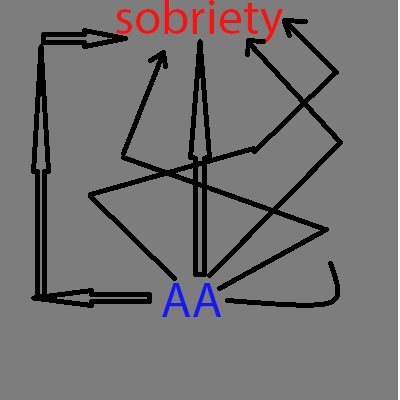AA without imposing your views and beliefs
I came in to AA just before my 30th birthday, knowing that AA was one of the most successful organisations we have for arresting the dreadful addiction of alcoholism for millions of people around the world.
However, I was very concerned that it would not work for me, as I came in as a confirmed atheist , following a very traditional catholic education and the realisation at 16 that , intellectually, there was no way I could accept the concept of an omnipotent, interventionist deity controlling my destiny.
I was also working professionally with clients with a range of alcohol, drugs and mental health problems, so knew a lot about the theory of addiction. Of course, like every newcomer, this had not enabled me to stop drinking on my own, and so I was in a big dilemna . I knew of , and desperately wanted, to obtain the help of AA to arrest my progressive alcoholism, but I was torn by the knowledge that I would not be able to accept it’s central principle of finding a God of my understanding, and handing over to a Higher Power.
It is totally impossible for me to accept the idea of an interventionist deity which will actively intervene in my life if I pray for help, whether that be “God ,as I understand Him” , or handing over to a Higher Power.
It also struck me as pretty illogical that I should be chosen for help if I followed AA’s suggestions, yet billions of other people who had not come to AA, with alcoholism or a myriad of other enormous problems, would remain suffering or even dying – a personal belief which is at the core of my reasoning for discounting interventionist deities of any kind.
So , I was in a conflicted state as a newcomer, and in those days we did not have any agnostic, atheist or free-thinking meetings to go to for support or guidance.
I was very lucky in the guy who first contacted me via the telephone office. He was to become my first sponsor, and was enormously patient, respectful and practical with me – above all else, he taught me a very important lesson, which I try and pass on to newcomers;
And that is to say that the number one priority is to stay around long enough for our mind to clear, at which point we can address the programme in a way that makes sense for us, and appreciate the universal truths contained in the programme which are bigger than the rather restrictive and paternalistic language our literature and customs would suggest on first reading.
This means of course that you put everything else on hold , and concentrate on building the foundations of sobriety rock solid to start with – so we have to stay away from one drink one day at a time, keep going to meetings, and try and share as much as possible so we begin to feel comfortable being honest with ourselves and others, as the first step to bring about changing our attitude and approach to life.
After a rocky start, I followed this advice, and for the first year concentrated on going to as many meetings as possible, doing as much service as I could – totally totally invaluable- and starting to listen to some amazing members I met who really showed me what life was all about , and gave me a deeper insight in to the human condition and what’s important in life. I think it’s important to emphasise this point, as I came in with strong feelings of shame, remorse , guilt and embarrassment, which had led to low self esteem, and as the early days of sobriety added up, these negative feelings were gradually replaced with positive feelings of increased self-esteem, self worth, selflessness, and compassion for others. I firmly believe engendering these new qualities in ourselves after years of destructive drinking, are one of the main reasons why AA is so successful for us .
Interestingly, if we do nothing else except stay away from the first drink and come to meetings, I think that alone can have enormous benefits for us. However, as we begin to look at the programme, we begin to understand what makes us tick , what we’d like to work on to improve our lives in different areas, and develop an understanding of the programme which works for us.
Now, almost 35 years later, I’m delighted to say that this approach has worked for me. I’ve experienced some amazing and exhilarating highs in life since getting sober, as well as getting through the big personal human events we cannot escape as we get older – all have been dealt with without the need or desire to take a drink.
So I remain eternally grateful to AA for giving me my life back ,and enhancing the quality of life I live today.
I often stress, therefore that my observations and criticisms of AA are always meant to be constructive, so we can appeal to as many alcoholics as possible to stop drinking and get their lives back as well.
I’m a great believer in encouraging people that working the programme should be developed and tailored to suit the individual person working with a sponsor, rather than suggesting there is only one way to do this, which is the impression most newcomers are given, and which often means they do not come back !
My great passion these days is to address the huge scandal that so many newcomers do not stay in the rooms long enough to get sober, and, what we hear every week in our Free-Thinkers Meeting in London, is that this is down to the problems people have accepting the God Concept ,particularly in this the 21st century.
In my view, therefore, we have to find a way to modernise our language and approach to make AA more welcoming and inclusive for the newcomer, without seeking to diminish the universal truths contained in the programme.
That is why I’m so delighted that the Agnostic, Atheist, Free-Thinking movement is really starting to take off now – our time has come , and new meetings are opening up all over the world. It’s important to say that this should not be seen as a threat to the Fellowship – rather it should be viewed as complimentary and expanding the appeal we can offer to suffering alcoholics. As we say in the pledge – I am responsible, whenever anyone anywhere reaches out for help, I want the hand f AA always to be there -and for that I am responsible.
That’s why we have an obligation to be welcoming and inclusive to everybody, and why we should not put obstacles in the way of the newcomer , thereby saving future lives and untold misery for the alcoholic and their family. I really think that’s a prize worth fighting for for future generations.
I think the approach I try and practice is best summed up in the Introduction we have to our Free-Thinking London Group’
„The purpose of our meeting is to help those of us who are uneasy with the concept of god to find recovery from alcoholism. All members are welcome, here, regardless of any spiritual belief, or lack of belief.
Alcoholics Anonymous does not demand that you believe anything. Our only wish is to assure suffering alcoholics that they can find sobriety in AA without having to accept anyone else’s beliefs, or deny their own.”
Cyril
Agnostic, Atheist and Free-Thinkers Meeting Islington, London



